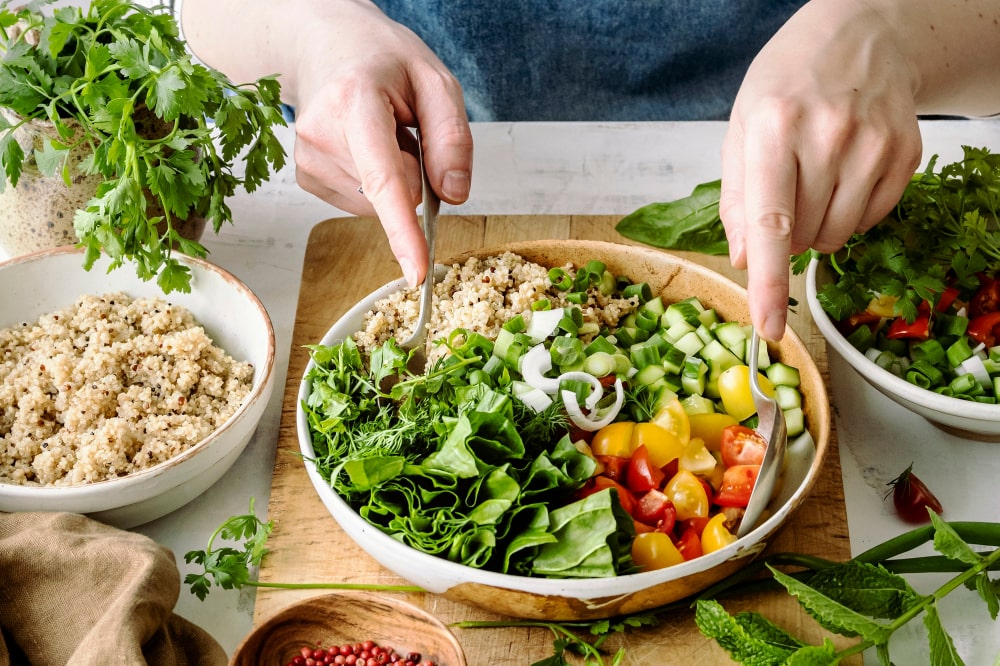
Amongst the most wasteful industries created by man is the global food industry that uses huge amounts of land, water and other resources in the production process all the while emitting vast quantities of greenhouse gases.
What we eat and the way we eat have transformed our planet. All over the globe, forests have been obliterated to make room for growing crops to feed livestock. The oceans too have become barren due to overfishing. The food industry doesn’t only drive wildlife loss, it’s also a major contributor to climate change as around a quarter of global greenhouse gas emissions are produced by its practices.
Food sustainability isn't easy to accomplish, and sticking to an environmentally friendly diet is challenging for even the most fervent eco-warriors, but here are the ways that can help you get on the right path.
Sustainable eating
Sustainable food is one grown in a way that minimizes its negative impact on the environment and the communities that produce it. Such a production process limits greenhouse gas emissions and uses the natural resources as responsibly as possible. This, in return, lowers its carbon footprint to a minimum, and by choosing sustainable food we also lower our personal environmental impact.
In addition to environmental factors, sustainable eating is also concerned with the way animals are reared and slaughtered, and how the workforce is paid and treated.
Be mindful and practical
Being a mindful eater means you are fully aware of your eating habits, meaning that you make educated choices, take time to eat healthy foods, you focus on food while eating and fully understand the difference between hunger and appetite.
It also means you focus on eating more raw food in season instead of looking for foods that grow in distant places whose transport only adds to environmental pollution. Also, eating raw food, seasoned with cold pressed olive oil rich in antioxidant and vitamin E uses no energy to prepare so you reduce your overall energy consumption.
When you do choose to cook, cooking larger batches of foods like sauces, soups, or chillies will save your time and energy as well. This may sound overwhelming at first, but it is important to bear in mind the environmental benefits of this practical approach!
Eat more plant-based foods
Farming animals for meat and dairy demands lots of space and enormous amounts of water and feed. This branch of industry generates around 15% of all man-made greenhouse gas emissions. With global meat consumption soaring in the last 30 years, it is obvious we have to find a way to rebalance our diets by downscaling our consumption of animal products and prioritising plant-based foods.
Amongst the most widely produced and available foods are beans and rice. Both can easily be integrated into our existing daily diet and can be prepared in a large variety of delicious ways. Beans are legumes, and they are produced sustainably with low water content and high return. They’re also very healthy with high protein levels.
Rice is also easy to grow and despite being grown in paddies of water, it doesn't require much water - the water is there to keep away harmful pests and bacteria. Rice is easy to cook and can be stored for long periods of time.
Naturally, a sustainable diet must include vegetables, but these should be selected carefully. Take the organic route, which doesn't involve the use of pesticides. This keeps the veg natural, protects the soil from saturation with artificial substances, which, in return, guarantees the long-term viability of farmlands.
Make better seafood choices
Aquaculture faces its own issues with approximately 94% of fish stocks overfished. With responsible production, seafood offers benefits to people, nature and climate. Try different species from well-managed sources with lower carbon emissions.
It takes persistent, smaller changes in our diets to have a big impact and it does require rearranging our priorities. Once you do that and have a better understanding of the matter, it becomes much easier to make more educated eating decisions.
Written by Diana Smith
About the Author
Diana Smith is a full time mum of two beautiful girls and is interested in sustainability, ecology and home improvement. She enjoys exercising and preparing healthy meals for her family. You can find her on and Twitter here.
You may also like
A Beginner's Guide to Sustainable Grocery Shopping
A Beginner's Guide to Zero Waste Living
Live Greener With These 4 Sustainability Tips
How to Store Ingredients to Avoid Food Waste
